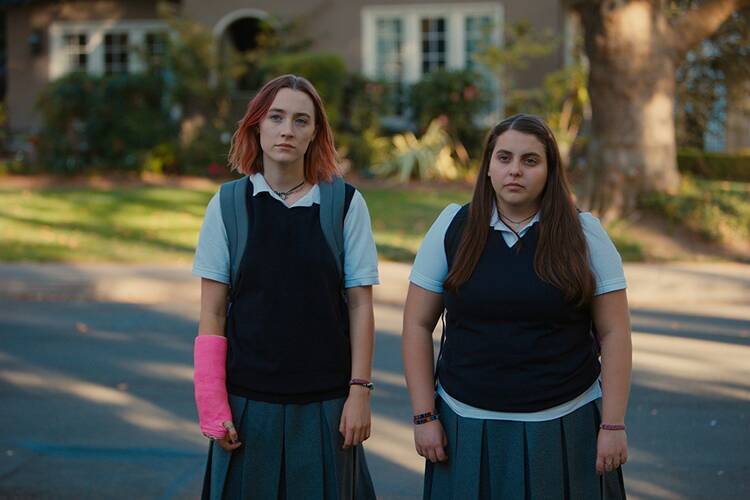“Who made the world?” Mary Oliver asks in her poem “The Summer Day.” For Catholics, there’s an easy answer to that question; but human beings of all creeds seem to have trouble accepting or remembering it. We try, again and again, to convince ourselves and others that we are our own creators, that every facet of our identity is a choice and every achievement is through our efforts alone. This is the logical extreme of individuation, the developmental process by which we carve out a distinct identity. It’s a lifelong process, but it often begins with our attempts to differentiate ourselves from our parents. But the truth is that no one makes themselves. We are shaped by events, places and especially relationships, although we often don’t realize their influence at the time. It’s only when we look back that we discover what and who made us.
Christine “Lady Bird” McPherson (Saoirse Ronan)—the titular protagonist of “Lady Bird” (2017), written and directed by Greta Gerwig—is in the process of figuring out who she is. A senior at a Catholic girls’ high school, she is doing her best to achieve escape velocity from her mundane life in Sacramento by casting herself in more dramatic roles. She applies for colleges on the East Coast, ignores her kindhearted friend Julie (Beanie Feldstein) in favor of wealthier, cooler classmates, and falls for a brooding boy who treats her like garbage (Timothee Chalamet). She’s even chosen a new name; when a teacher asks if Lady Bird is her given name, she responds: “Well, I gave it to myself. It’s given to me, by me.”
Most of all, she wants to differentiate herself from her mother, Marion (Laurie Metcalf). The two have a tumultuous relationship, full of both warmth and tension. Their priorities are as different as can be: Lady Bird is studiously free-spirited and chafes against her mother’s caution. At the same time they’re both strong-willed (a reason they fight so much) and capable of deep empathy. Sometimes they come into alignment, but often they frustrate and confuse each other. “I want you to be the very best version of yourself that you can be,” Marion tells her daughter. “What if this is the best version?” Lady Bird asks. It’s a funny and painful moment: both reaching towards each other and coming up against an immovable barrier in understanding.
This is the angst of individuation: trying to adopt a vision of yourself that feels true and honest, while the people who love you struggle to let go of their own cherished image of you. Lady Bird and Marion do a lot of emotional damage to each other over the course of the film, but in some ways it’s necessary. You only become yourself by leaving the nest.
But you never totally abandon the things that shaped you. You find yourself echoing parental advice that once made you roll your eyes, or feeling nostalgic for that town you couldn’t wait to escape when you were young. Lady Bird rolls her eyes through school Masses, but when she’s across the coast for college we see her wander into a church one Sunday morning to listen to the choir; it’s gone from an imposition to something that reminds her of home. We often don’t recognize our influences until much later. It’s the things we’re closest to that we have the most trouble seeing clearly.
In one scene, Lady Bird reviews her college essay with a teacher, Sister Sarah Joan (Lois Smith). It’s about Sacramento, a place she’s only groaned about up to this point, and she’s surprised when Sister Sarah Joan says she clearly loves her hometown because she writes about it in such intimate detail. Lady Bird shrugs it off; she just pays attention. “Don’t you think maybe they are the same thing?” Sister Sarah Joan presses. “Love and attention?”
Perhaps they are. Returning to Mary Oliver, later in “The Summer Day” she writes: “I don’t know exactly what a prayer is. I do know how to pay attention…” This follows an intimate description of a single grasshopper that has landed on her as she reclines in the summer grass, capturing the minute movements of its legs and wings and mandibles. That sort of attention inspires awe, causes us to reflect on the one who creates, to recognize ourselves as part of that creation: molded, formed, always in-process.
We don’t create ourselves, but instead are slowly revealed. We think we are writing our own stories only to be surprised every time we turn the page. It’s only when we look back that we begin to recognize what and who made us, the soft prints of the fingers that shaped us embedded in our lives.
“Lady Bird” is streaming on Max.








